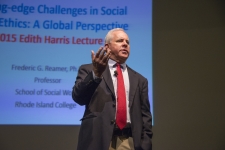Remote counseling technology "here to stay," ethicist tells Wayne State social workers about need for ethical, practice guidelines

The adoption of digital and electronic tools in social work practice is a "bell that cannot be unrung," an international social work ethicist told a Wayne State audience on Nov. 12, saying the profession must embrace the benefits of this popular technology and adopt guidelines governing best practices, ethics, and regulation.
Frederic Reamer, professor at the Rhode Island College School of Social Work and an author of the National Association of Social Workers' Code of Ethics, delivered the School of Social Work's 28th Annual Edith Harris Endowed Memorial Lecture on the topic of cutting-edge ethical issues facing practitioners. He said remote counseling technologies can increase access to behavioral and mental health services for a range of individuals, including people who have disabilities, who live in geographically remote or underserved areas, who are averse to in-person counseling, or whose personal or professional schedules conflict with conventional office hours. But these technologies should whenever possible complement and support therapeutic relationships that are formed and maintained face-to-face, Reamer stressed, saying services specifically designed to circumvent that in-person component "" such as TalkSpace, which charges customers $25 a month to seek and receive clinical advice anonymously and entirely by text message "" raise serious concerns.
"Some of this technology has the potential to be wonderful and some of it scares me to death," said Reamer, who has served as an expert witness in legal cases nationwide involving ethics violations by social workers.
Reamer warned that digital and electronic practice tools raise ethical issues related to practitioner competence, licensure, privacy and confidentiality, informed consent, conflicts of interest, boundaries and dual relationships, and documentation. What is an ethical response time to an urgent 2 a.m. text message from a client? What is the duty of a social worker offering therapy via video feed to ensure the client has not asked another party to sit in on the session off camera? Does the cost of a smart phone data package required to exchange text messages with a therapist impede access to low-income clients? Does providing clients online access to therapists' notes create dangerous opportunities for those notes to be carelessly disseminated?
To address these and myriad other ethical "gray areas" posed by digital and electronic practice tools, Reamer has been working with international social work leadership on a number of resources. He recently chaired the Association of Social Work Boards (ASWB) commission that wrote "Model Regulatory Standards for Technology and Social Work Practice," is part of an effort to revise NASW's current Code of Ethics to reflect today's technology, and is working to develop practice standards for these tools with NASW, ASWB, the Council on Social Work Education, and the American Board of Examiners in Clinical Social Work.
Reamer said social workers should anticipate that digital and electronic practice tools will impact social work licensure in a number of ways. Related competencies will be incorporated in licensing law, and use of technologies will introduce "more opportunities for clients to file complaints." Noting that Louisiana requires social workers to be licensed in Louisiana even if they live in other states provided they offer remote counseling to Louisiana residents, Reamer said social workers will have to learn the licensing law in any state where their services "land."
Reamer's talk also addressed broader issues of ethics and ethics instruction. Praising the contributions of former Wayne State School of Social Work Dean Sidney Dillick (1981-99) to the origins of the NASW Code of Ethics, Reamer walked the audience through a history of social work ethics, from its emphasis on morality, then core values, then ethical dilemmas and decision-making, then ethics and risk management, and, most recently, its arrival in the digital period.
Reamer said social work curricula should differentiate between ethical mistakes made by conscientious, well-meaning professionals, deliberate ethical decisions characterizing a social worker's clinical judgment and practice management, and ethical misconduct resulting in loss of licensure and even criminal prosecution. Social work students should also be asked to debate ethical dilemmas, which Reamer described as situations in which practitioners must grapple with competing duties or obligations.
Likening ethics to the "immune system" of social work, Reamer said the field must respond rapidly to changes that leave the practice and practitioners vulnerable.
"We are now dealing with issues I couldn't have dreamed of when I was drafting the current Code of Ethics," he said. "We need to do a lot of hard thinking about where we're going as a profession."